Marco Rubio Concerned Biden Treasury Won’t Be Tough Enough on China
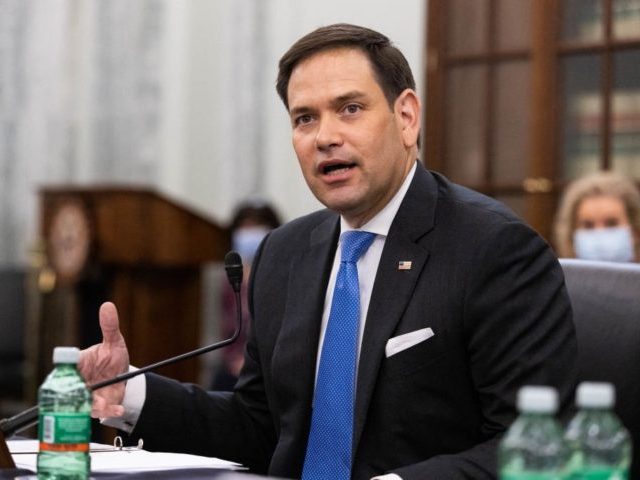
Sen. Marco Rubio (R-FL) expressed concern Thursday that a Biden administration executive order that changed Trump-era rules on U.S. investment in Chinese companies would give too much authority to a Treasury Department “too closely aligned with Wall Street.”
The Biden administration this week issued an executive order that expanded a Trump executive order banning U.S. investment in Chinese companies supporting China’s military to companies that also sold surveillance technology.
However, Biden’s order moved authority for the ban from the Defense Department to the Treasury Department, which Rubio argued would put a Treasury Department close to Wall Street in charge of creating and maintaining the list of Chinese companies that would face financial penalties.
“We know for a fact that Wall Street is helping to finance the Chinese Communist Party’s effort to weaken and ultimately replace American leadership,” Rubio said in a statement:
The story of the past two decades has been America’s unwillingness to confront Beijing’s exploitation of our legal, political, and financial systems. While the administration updated the Trump-era policy in important ways, I am very concerned that President Biden’s Treasury Department is too closely aligned with Wall Street to take the actions necessary to prevent American savings from being used to fund the Chinese Communist Party.
A Biden official told the Washington Post that the Treasury Department has more experience drafting sanctions programs “in a way that meets all the U.S. judicial and legal standards.”
“Treasury has a regulatory structure to list names and enforce prohibitions. Defense doesn’t,” said Kevin Wolf, a former senior Commerce Department official.
A former Trump official, David Feith, told the Post that Biden’s move is “a welcome thing,” but said shifting enforcement from the Defense Department to Treasury might complicate implementation because “the Department of Defense takes a fundamentally national security-focused perspective on things and Treasury traditionally does not.”
Rubio warned in a recent American Prospect article that American capital markets are the most “open, liquid, and valuable in the world” and are “increasingly a source of funds for China’s most strategically important companies.”
“Chinese companies that produce surveillance technology and weapons of war that could one day kill Americans finance their investments with Wall Street capital,” Rubio wrote.
Rubio also noted that at the same time U.S. corporations are enriching China and turning a blind eye to its human rights abuses, they are taking left-wing stances in the U.S. to curry favor with a new base of Democrat support. He wrote:
It’s the height of hypocrisy. U.S. corporations with lucrative business ties to the Chinese Communist Party will boycott states here over anti-abortion laws, while Beijing systematically sterilizes Uyghur women. They routinely inflame divisive race issues within the U.S. while marginalizing African American actors or erasing Tibetan characters to keep Chinese audiences happy.
Rubio noted that Wall Street has intervened to protect Chinese companies, to the detriment of American national security. He said for example, when the Trump administration called for the delisting of Chinese companies tied to Beijing’s military from the stock market last fall, Wall Street “went to bat to ensure that three Chinese telecommunications firms complicit in state censorship, China Telecom, China Mobile, and China Unicom, were spared.”
Although the three companies ended up recently delisted, Rubio noted the Biden administration has allowed one of China’s biggest electronics companies, Xiaomi, to relist on U.S. exchanges.
Rubio also noted in his article that the U.S. became a net investor in China for the first time in history in 2019, after China opened its market to American financial companies and sought the listing of its businesses on American stock exchanges, allowing American investment portfolios to become increasingly invested in Chinese companies.
“Many well-meaning Americans may inadvertently be propping up a genocidal regime because Wall Street does it for them,” he wrote.
Rubio said in his statement Thursday:
We need to start requiring more transparency from Wall Street when it comes to investing in China and Chinese government controlled companies. … Beijing long ago figured out how to get rich and powerful Americans to use their influence in American politics.
He added, “Allowing Wall Street and Big Finance to enrich themselves by hurting Americans, they make a lot of money in the short term, for those individuals, but it is hurting America in the long run. in the long run. It is national economic suicide.”
Follow Breitbart News’s Kristina Wong on Twitter or on Facebook.
U.S. Trade Deficit with China Jumps 14%
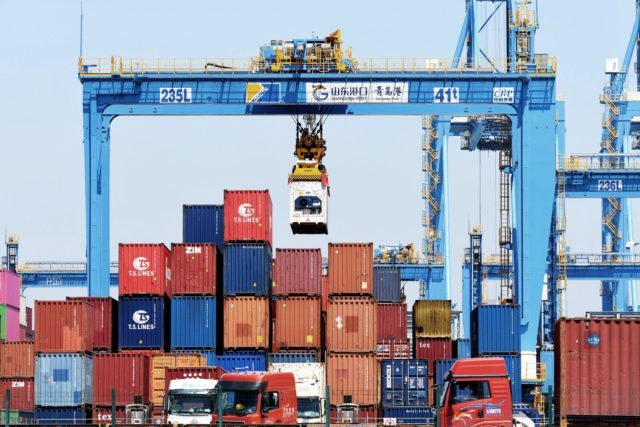
BANGKOK (AP) — China’s exports and imports surged in May and its politically sensitive surplus with the U.S. grew as the pandemic was waning in important markets in the West.
Customs data released Monday showed China’s exports rose 28 percent from a year earlier and imports soared 51 percent, but growth was leveling off after the country’s stunning recovery from the slump early in 2020.
Three years into a tariff war with Washington, tensions over the trade gap persist even with business recovering from last year’s shocks as vaccinations rates rise.
The trade surplus with the United States rose 14 percent to $31.8 billion, while China’s trade surplus with the European Union was $12.7 billion.
Last week, President Joe Biden issued an executive order expanding the number of Chinese companies that will be off-limits to U.S. investors in the latest indication he his administration has not softened Washington’s stance on alleged security risks from companies U.S. officials say are linked to the Chinese “military and industrial complex.”
Over the weekend, U.S. Trade Representative Katherine Tai said at a virtual meeting of the Asia-Pacific Economic Cooperation forum that a “significant imbalance” remains in trade between the two largest economies that was “damaging in important ways to the American economy.”
Biden has embraced a return to multilateral forums like the APEC and the World Trade Organization, a rules-making body that Washington says requires significant reforms. In the meantime, progress toward resolving the tariffs war that began under his predecessor, former President Donald Trump, has been fitful.
China has led the global recovery from the pandemic, which is still raging in many parts of the globe but receding in places where vaccinations have been widely deployed. Chinese manufacturers have benefited from strong demand for protective gear and other products as other countries battled COVID-19, gaining market share from their competitors.
The customs data released Monday showed exports rose 28 percent from a year earlier and imports soared 51 percent — at the fastest annual pace in over a decade. Total exports climbed 40 percent in the first five months of the year from a year earlier. They were up 29 percent from the same period in 2019.
The base level boost from last year’s slump is fading, however, and the $263.9 billion in Chinese exports in May was about level with the previous month. China’s imports of $218.4 billion in May were 1.2 percent lower than in April.
China’s total trade surplus in May was $45.53 billion, down 26.5 percent from a year earlier.
While the increase in exports was robust in May, it was slower than some economists had forecast. Analysts said one reason might be delays at ports in southern China, the main shipping hub, due to increased precautions to fight an outbreak of coronavirus cases in that part of the country.
Shortages of semiconductors that are plaguing many industries have likewise hit exports of electronics. Demand for products that surged while people were staying home due to the pandemic, such as toys and furniture, also is weakening, Julian Evans-Pritchard of Capital Economics said in a commentary.
“Headline trade growth remained elevated last month. But trade volumes dropped back in levels terms and, while supply constraints are partly to blame, there are signs that demand may be peaking, too,” he said.
A key factor behind last month’s rapid increase in imports was rising prices for oil and other commodities needed to fuel the country’s industries. But it also reflects stronger demand for the inputs needed to make so much of what China exports.
That is helping neighboring countries in Asia that supply many such goods, such as electronics components. Imports from the 10-nation Association of Southeast Asian Nations soared nearly 54 percent from a year earlier, to $33.1 billion. Exports to the region, where many countries are contending with their worst coronavirus outbreaks so far, rose 40 percent to $39.2 billion.
___
Associated Press researcher Yu Bing in Beijing contributed.
WHO SERVES OPEN BORDERS AND RED CHINA MORE THAN BIDEN?
Since 2001, U.S. free trade with China has eliminated at least 3.4 million American jobs. In 1985, before China entered the WTO, the U.S. trade deficit with China totaled $6 billion. In 2019, the U.S. trade deficit with China totaled more than $345 billion.
A town in Weirton, West Virginia lost 94 percent of its steel jobs due to the North American Free Trade Agreement (NAFTA). Voters in Weirton supported Trump by 67 percent last year compared to President Joe Biden’s 32 percent.
Kamala Harris Tells Migrants ‘Do Not Come’ to U.S. Border as DHS Keeps Releasing Border Crossers into U.S.
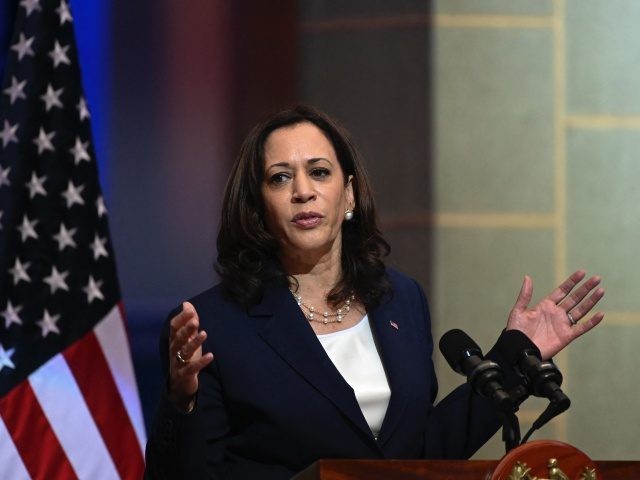
Vice President Kamala Harris told Guatemalans on Monday that they must not come to the United States-Mexico border, even as the Department of Homeland Security (DHS) continues releasing thousands of border crossers into the U.S. interior.
“I want to be clear to folks in this region who are thinking about making that dangerous trek to the United States-Mexico border: Do not come. Do not come,” Harris said during a speech in Guatemala.
“We, as one of our priorities, will discourage illegal migration,” Harris said.
The remarks are in contrast to the Biden administration’s massive Catch and Release policy where border crossers are often apprehended and subsequently released into the U.S. interior with only a promise that they will appear at immigration hearings months, and sometimes years, later.
DHS Secretary Alejandro Mayorkas has set out a plan that tasks the federal government and United Nations-linked non-governmental organizations (NGOs) with releasing border crossers into the U.S. interior and providing them with one-year work permits to take American jobs.
As of the end of March, more than 45,000 border crossers were estimated to have been released into the U.S. interior by DHS. In addition to those releases, NGOs are finding migrants in Central America and Mexico to bring to the U.S.-Mexico border for release.
These releases are being quickly facilitated by DHS’s “CBP One” mobile app that allows migrants to input their information to confirm whether or not they are eligible for release into the U.S. interior.
The process often includes border crossers being put up in migrant hotels, paid for by American taxpayers, before getting bused and flown on domestic commercial flights into major U.S. cities.
From February 19 to April 22, as Breitbart News reported last month, the Biden administration had flown about 7,200 border crossers into the U.S. interior. Border crossers are allowed to bypass photo identification requirements, boarding flights without a photo ID, and do not have to prove they are negative for the Chinese coronavirus.
John Binder is a reporter for Breitbart News. Email him at jbinder@breitbart.com. Follow him on Twitter here.
Survey: Protecting U.S. Jobs, Cutting Immigration Key to Winning Over Voters
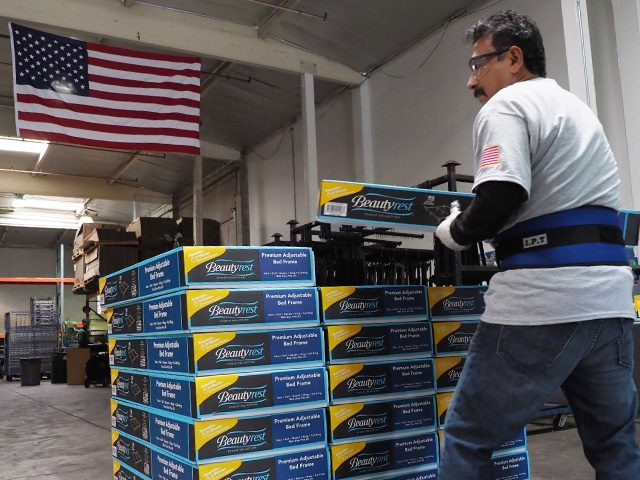
United States voters remain overwhelmingly favorable to economic nationalist policy prescriptions, a survey reveals.
A survey from the liberal Center for American Progress, founded by John Podesta, finds that voters’ top foreign policy priorities are protecting jobs for Americans, 47 percent, and reducing illegal immigration to the U.S., 42 percent.
The foreign policy issues are the highest-ranked among swing voters as well as Republicans, while Democrats, by a plurality of 44 percent, say combatting global warming is their top priority.
Meanwhile, promoting global trade and pushing democracy abroad rank as the lowest foreign policy priorities for voters. Among Republicans, the two issues rank as the least important.
When asked what the top priorities should be for the president and Congress over the next five years, voters ranked controlling the Chinese coronavirus, boosting jobs and wages for Americans, and cutting overall immigration to the U.S. as their top three issues.
Republicans rank cutting overall immigration to the U.S. as their top priority for a president and Congress with 6-in-10 GOP voters saying so.
The survey comes as the Republican Study Committee (RSC), chaired by Rep. Jim Banks (R-IN), released its Fiscal Year 2022 budget — an insight into the priorities of conservative lawmakers.
The RSC budget endorses a national legal immigration policy that prioritizes “American workers, help[s] grow our middle class, raise wages, and enhance[s] economic opportunity for all lawful residents.”
Current legal immigration levels, where about 1.2 million legal immigrants acquire green cards annually, are opposed by the vast majority of Republicans and conservatives — a grassroots rebuke of the U.S. Chamber of Commerce’s agenda for mass immigration.
The latest Rasmussen Reports survey shows that 54 percent of Republicans and 52 percent of conservatives want legal immigration levels cut in at least half, down to fewer than 500,000 annual admissions.
Such a policy is executed, the budget states, by reducing legal immigration levels, ending the nation’s birthright citizenship policy, barring employers from hiring illegal aliens over Americans, and preventing welfare-dependent legal immigrants from permanently resettling in the U.S., among other policies.
Though while the RSC budget matches its constituents’ priorities on immigration, it veers off in its promotion of free trade over U.S. job protections and tariffs on foreign imports.
The budget, for example, denounces the use of tariffs on foreign imports to protecting domestic American manufacturing and jobs. Instead, the budget embraces a broad “promoting free trade” agenda.
“Simply put, free trade is how we put America first,” the RSC budget reads, citing the Chamber of Commerce. As free traders sought to pass when former President Donald Trump was in office, the RSC budget endorses legislation to prevent a president from increasing tariffs on foreign imports without first securing congressional approval.
The provisions are hugely out-of-line with the majority of Republicans. The latest Gallup survey found that Republicans’ opinions of foreign trade as a net benefit to the U.S. economy have dropped to the lowest point since the firm began tracking the opinions of voters on the issue in 1991.
Today, 51 percent of Republicans view foreign trade, specifically imports, as a threat to the U.S. economy while just 44 percent see foreign trade as a benefit. By comparison, in the year 2000, 59 percent of Republicans had a positive view of foreign trade — a 15 percentage point drop over the last two decades.
Much of the change in Republicans’ opinions on free trade are credited to the Washington, D.C. beltway’s decades-long consensus on the issue which claims that trade deficits have no impact on U.S. jobs or wages.
Many Republican voters, though, have seen firsthand the devastating impact.
Every year, as federal data shows, Americans lose their jobs to offshoring and plant closures as a result of U.S. free trade policies. In 2020, at least 109,000 Americans were certified as having lost their jobs as a result of foreign trade.
In March, 81 Americans employed at the General Electric Lighting-Savant in Bucyrus, Ohio were told they would be laid off as the company offshores production to China. The closure of the plant, which has been in the area since 1942, would mean a $100,000 tax revenue loss with a total of 200 Americans laid off in the small town of fewer than 12,000 residents.
Since 2001, U.S. free trade with China has eliminated at least 3.4 million American jobs. In 1985, before China entered the WTO, the U.S. trade deficit with China totaled $6 billion. In 2019, the U.S. trade deficit with China totaled more than $345 billion.
A town in Weirton, West Virginia lost 94 percent of its steel jobs due to the North American Free Trade Agreement (NAFTA). Voters in Weirton supported Trump by 67 percent last year compared to President Joe Biden’s 32 percent.
John Binder is a reporter for Breitbart News. Email him at jbinder@breitbart.com. Follow him on Twitter here.
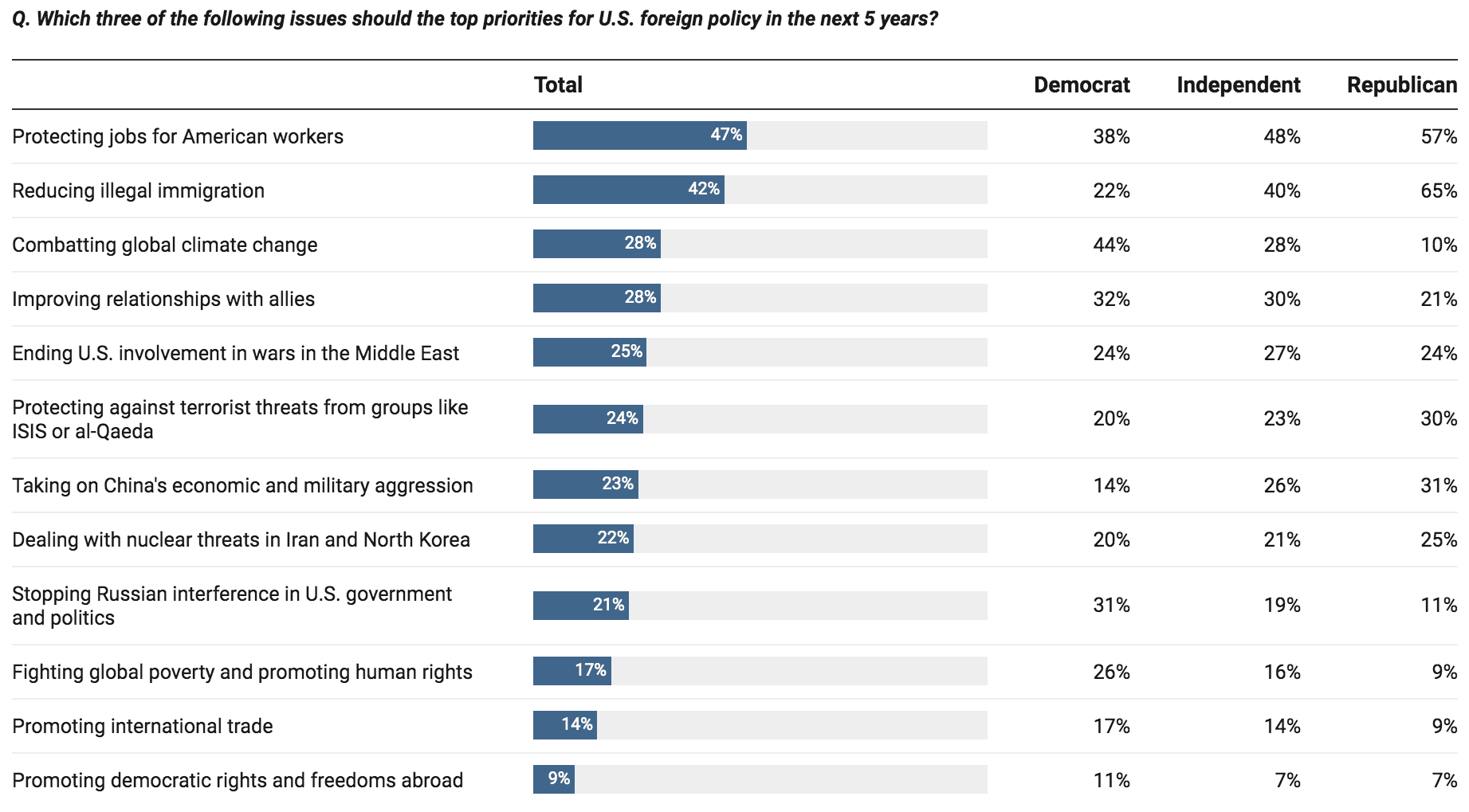
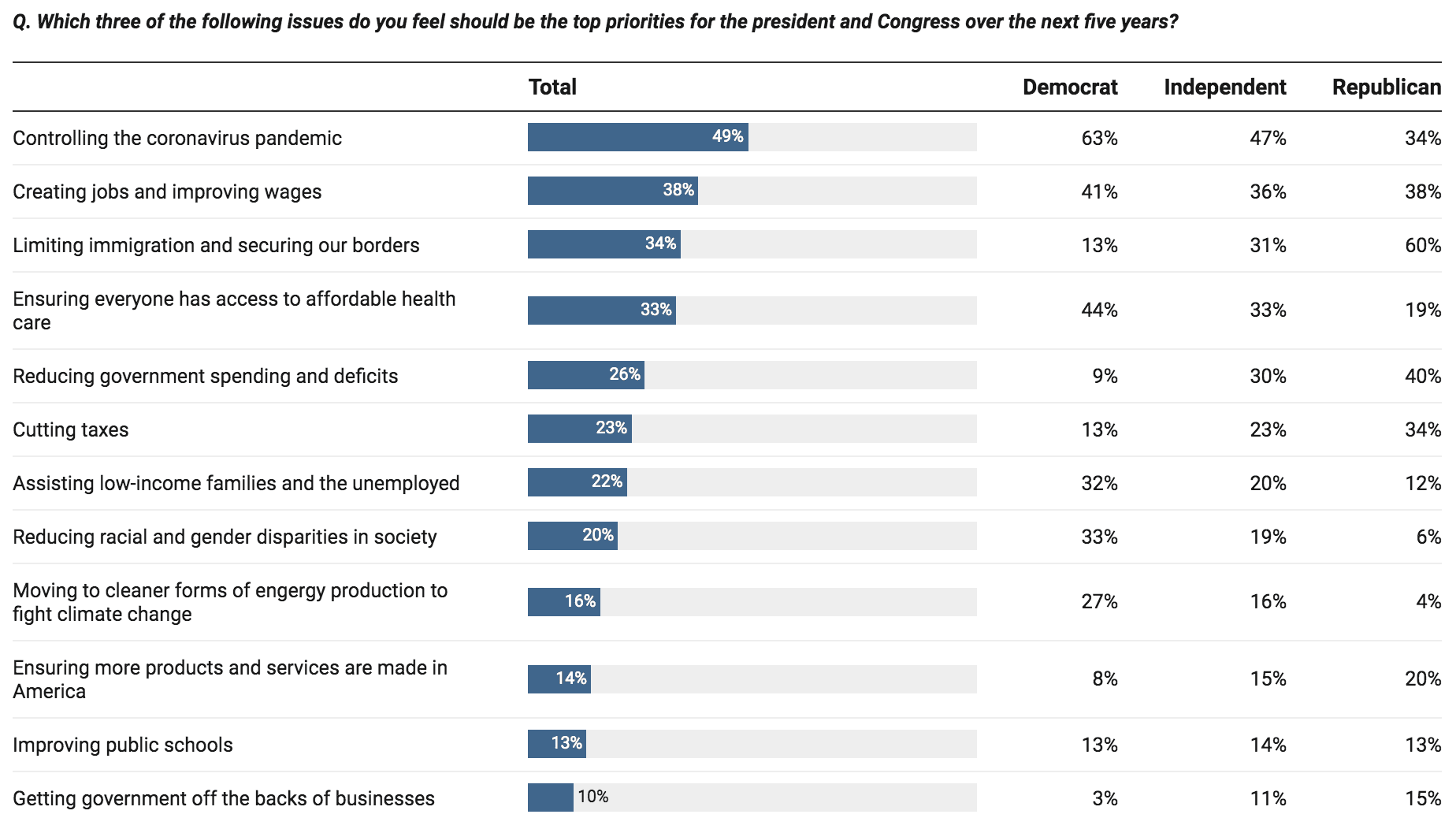
No comments:
Post a Comment